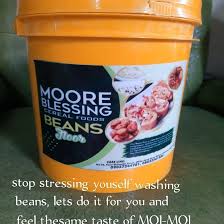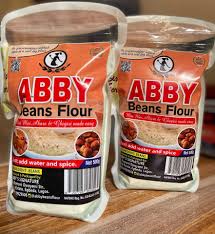![]()
If you’ve landed on this article page, you’re probably searching for a
good business idea—an idea that’s light on the pocket but heavy on
returns, promising both a fulfilling journey and potential profit.
|
How to start Beans Flour
Production Business in Nigeria
Beans are an important food that is widely grown and consumed by
a large number of Nigerians due to their high protein and
carbohydrate content.
Because of a lack of adequate storage facilities, staple foods
such as beans, plantains, yams, cassava, and others are wasted
in Nigeria every year after harvest. Farmers in Nigeria can
reduce harvest losses and earn more money by adding value to
their crops. By value addition, I mean the processing and
packaging of food items such as beans into bean flour that can
be sold all year in Nigeria and exported.
There are huge opportunities in exporting food stuff to overseas
countries, if quality standards and reliable volumes can be
provided. As an exporter of beans flour, you must organize your
supply chain well to compete, because your buyer expects the
same quality and compliance required for the main bean
varieties.
European buyers are always looking for new opportunities and
varieties that fit local demand. Interestingly, developing
countries still play a significant role in the supply of beans
and its products, especially, beans flour. The overall import of
dried beans is relatively stable. The annual supply of dried
beans to Europe is between 450 and 500 thousand tonnes.
The volume of Nigerian export of foodstuff to these countries is
still on a very small scale considering the estimation of 20
million people of African descent living abroad. This is a great
opportunity to sell to this category of people. The few
exporters of African foodstuff cannot meet with the demand of
Nigerians which populations are increasing everyday in the US
and UK.
Startup Capital: You don't have huge capital to do the business,
in fact with N100,000 and above you can start exporting Beans
flour abroad. So if your desire is to make steady income in
foreign currencies right here in Nigeria, then you should
consider starting Beans flour export business.
Aside from the local demand for packaged Beans flour, Nigerians
and other Africans living abroad consume a large amount of the
product. Before I go further, let’s take a look at the contents
of the business plan:
First, you decide how you want to start – small, medium or
large-scale. For small and medium scale, you can start anywhere,
anytime with a little amount of money. You will sweat a bit,
though, because of the manual nature of the work involved. This
is usually not a big deal for the hard working entrepreneur. To
start on a big scale, some machinery is required.
While the cost of machinery could be overwhelming for a
beginner, locally fabricated machines will do for a start. There
are engineers who can make these machines at a fraction of the
cost and with as much efficiency
This is a document that describes the Beans Flour Business, the
products and services, and the customers to sell to. It explains
the business strategy. How to build and grow the business, what
the marketing strategy is, and who the competitors are.
In response, an increasing number of processed and ready to eat
products made from common bean are emerging across Sub-Saharan
Africa. Preparing high-quality flour from common beans is the
first step in the manufacture of these products, and use of this
flour by homemakers is becoming increasingly appreciated. In
comparison to conventional bean preparation by lengthy boiling,
use of flour offers substantial savings on cooking time and fuel
cost, and improves the bioavailability of vitamins and
micronutrient in derived food products. Bean flour is produced
by similar milling processes as performed for cereal grains and
other legumes. This technology provides a diversity of
bean-based products and recipes that are useful among rural and
urban communities. Manufacturing of flour and food products from
common bean creates a lucrative market that benefits the
livelihood of both farmers and entrepreneurs.
Startup Requirements: The following steps are needed for
enterprise development around bean flour and its widespread
replication: 1) Raise awareness with farmers, agri-food
companies and investors on the economic benefits of the
technology, 2) Formulate appropriate product standards,
packaging sizes and prices based on consumer demand, 3) Identify
profitable, durable and equitable strategies for taking bean
flour products to local, regional and international markets, 4)
Establish reliable supply of beans to processing plants through
contracted farming, 5) Set up equipment and production lines
that make efficient use of energy and labor, and 6) Train
operators and workers on safety and quality adherence throughout
the manufacturing process.
How to Make Beans Flour
Firstly, remove any stones or unnecessary particles, thereafter,
wash and remove the skin off the beans by using your hands, a
blender, or a food processor.
Stir the beans around from time to time to ensure that all area
of the bean is exposed to air and sunlight as its dries (Air
dryer machine).
The amount of time it takes to dry beans is strongly dependent
on the humidity level in the area.
It might take up to 3 days to 5days for it to dry properly. Bean
seed naturally is dry when you bite into it, and it cracks
immediately.
Simply take your beans for grinding to the market. The way they
grind Bambara groundnuts (Okpa flour), moreover, dry beans
require industrial grinders to process it into a fine powder.
But if you have a very high-powered grinder, use it.
Keep at room temperature in a well-sealed container.
It can be used in the preparation of bean cakes (Akara), Moi-moi
etc
Since the introduction of bean flour into the Nigerian market a
few years ago, most housewives have found it very simple to
prepare Fried Bean Cake (Akara) and Moin-Moin.
Get our Practical Training guide on How to set up a Beans Flour Production Business in Nigeria. The Beans Flour business plan provides a detailed roadmap for entrepreneurs seeking to dive into the Food Processing industry in Nigeria. The plan offers an in-depth analysis of essential commercial elements, equipping you with actionable insights to build a robust foundation for your venture. It meticulously explores the nuances of your business idea and considers the local market dynamics, competitive landscape, and the driving forces behind market growth.
|







